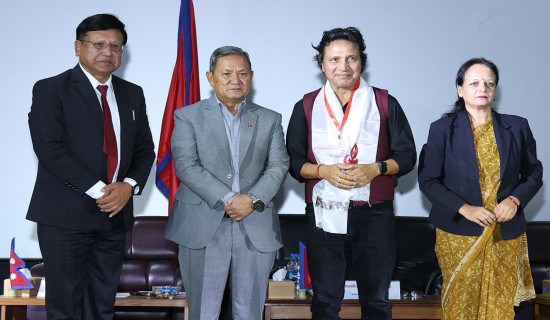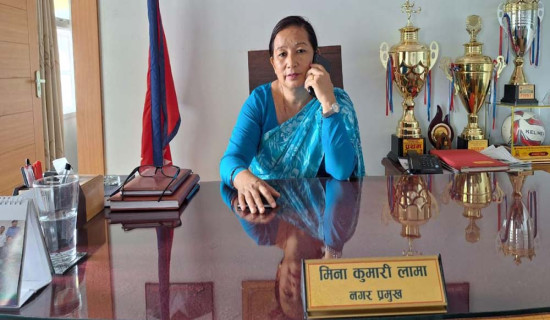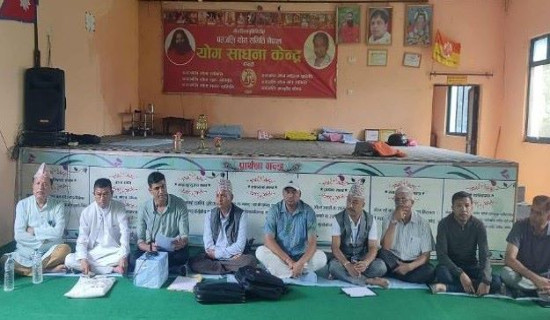- Monday, 1 September 2025
Expanding Ties Through Diplomacy
The ability of a foreign minister is often measured through his/her effectiveness in bilateral and multilateral engagements, and the impact of their foreign visits on promoting the national agenda. This is often referred to as the diplomatic activism of a foreign minister, involving demonstrating diplomatic skills on the global platform, negotiating on the issues of national interest and expanding the country's influence and relationships. One year in office, Minister for Foreign Affairs Dr. Arzu Rana Deuba seems to be successful in making a significant impact on Nepal's foreign relations, as she demonstrated diplomatic aptitude in many bilateral and multilateral meetings.
Last September, Dr. Rana addressed various high-level meetings in the United States, including high-level meeting of women political leaders, the G20 foreign affairs ministers meeting, the ministerial meeting of the Asia Cooperation Dialogue, the annual meeting of the G77 and China, and the ministerial meeting of the Non-Aligned Movement on the sidelines of the 79th Session of the United Nations General Assembly (UNGA). She accompanied Prime Minister KP Sharma Oli to New York to attend the UNGA Session.
Climate justice
Dr. Rana held sideline meetings with her counterparts and representatives from various countries, discussing a wide range of issues, including Nepal's bilateral relations and its national interests. Key discussed issues were the impact of climate change on Nepal and its advocacy for climate justice, the economic and technical assistance for the country to make its graduation from a least developed country by 2026 smooth and sustainable, help in securing Nepali citizen Bipin Joshi's release from Hamas hostage and seeking support for candidacies for key UN positions. Earlier, she participated in the meeting of the World's Women Foreign Ministers in Toronto and held bilateral discussions with foreign ministers of 10 countries.
She addressed the 58th session of the United Nations Human Rights Council last February and held bilateral meetings with the foreign ministers of Switzerland, Norway, the Philippines and Mexico. She asked for support in Nepal's candidacy for key positions in international bodies, including membership, especially for membership in the UN Human Rights Council, the Economic and Social Council and as a non-permanent member of the UN Security Council. She officially invited the world community to attend the first edition of 'Sagarmatha Sambad', a global dialogue platform on climate change, held in Nepal last May.
During her first major foreign visit to India on August 18, she met Indian Prime Minister Narendra Modi and Foreign Minister Dr. Jaishankar and discussed matters of bilateral cooperation and interest. Minister Rana said the meeting with PM Modi discussed the multifaceted aspects of Nepal-India relations. India decided to purchase an additional 251 megawatts of electricity from 12 hydropower projects in Nepal, bringing Nepal's total electricity export to 941 megawatts. This agreement, a milestone in Nepal's energy diplomacy, also marked the beginning of India's agreement with Nepal to import 10,000 megawatts of electricity in 10 years. An agreement was also reached between Nepal, India and Bangladesh for the export of Nepal's electricity to Bangladesh.
Dr. Rana accompanied Prime Minister Oli on an official visit to China, where Nepal signed the long-awaited BRI agreement. She held bilateral meetings with Chinese Foreign Minister Wang Yi in Beijing. Dr Rana also held meetings with her counterparts, ministers and leaders from Japan, Germany, New Zealand, Switzerland, Norway, Canada, Indonesia, Oman, Qatar, Israel, Philippines, Iran, Mexico and Sri Lanka, among others. Minister Rana made Nepal's significant diplomatic presence felt in the sixth BIMSTEC Summit in Bangkok, the 81st session of United Nations Economic and Social Commission for Asia and the Pacific (ESCAP) in Bangkok, the Raisina Dialogue in New Delhi, and most recently, the 44th session of the Food and Agriculture Organisation (FAO) held in Rome.
The Ministry of Foreign Affairs conducted an Organisation and Management (O&M) survey to address staff shortages in Nepali missions abroad, especially in the Gulf countries where a large number of Nepalis are working. They have complained that they lack prompt access to passport and consular services. For example, there are currently at least 70,000 Nepalis in California, USA, and over 100,000 in Texas. They have to go to New York or Washington, D.C., to get consular services. To address these difficulties, consulates general have been established in Dallas, San Francisco and Dubai in the UAE, following an O&M survey in the ministry.
Mobile service
A mobile service has been launched in some countries to serve Nepalis there. In order to provide services in the Middle East and other countries, staffing has been strengthened in key missions. The ministry has established an economic diplomacy division to attract direct foreign investment into Nepal and further promote the export market of Nepali products. The division has sprung into action, holding consultations to promote economic diplomacy in coordination with the related ministries, including Finance, Industry, Energy and Labour. Dr Rana represented Nepal at the International Court of Justice in The Hague and drew global attention to the problems faced by Nepal due to climate change. She said that Nepal should receive compensation as one of the most vulnerable countries. Since then, Nepal has taken climate diplomacy as a separate priority issue.
'Sagarmatha Sambad', organised by the Ministry, has served as a global dialogue platform. It extensively discussed the issues of regional and global importance related to climate change. The dialogue brought together experts, policymakers, representatives from over 20 countries, including neighbouring India and China, and over 50 international organisations. The world leaders participating in the dialogue expressed their commitment to support and assist Nepal's advocacy for climate justice.
(Pathak is a press advisor to Foreign Minister Dr. Arzu Rana Deuba)



-original-thumb.jpg)
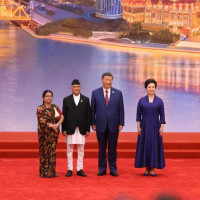
-square-thumb.jpg)
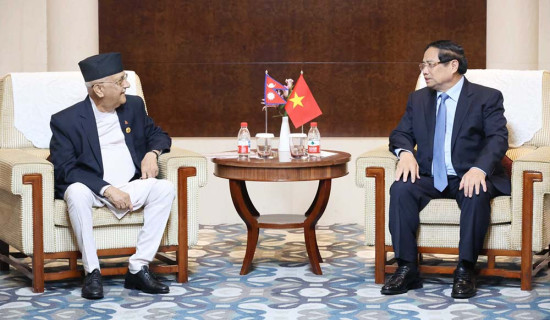
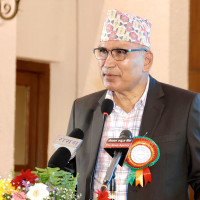
-square-thumb.jpg)
